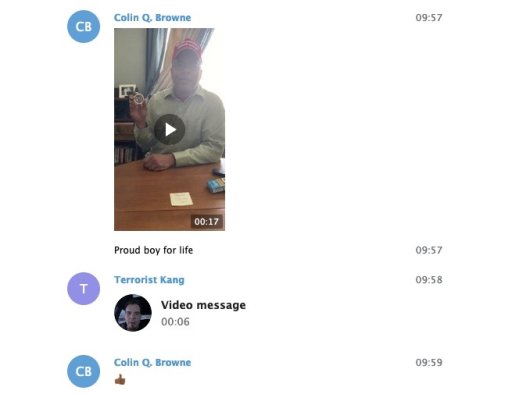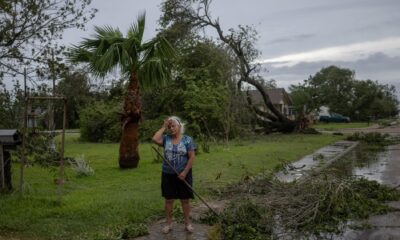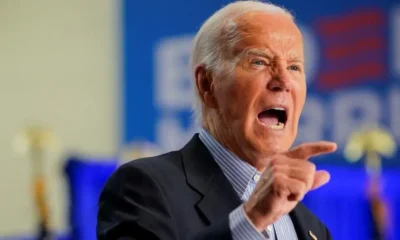On the morning the far-right Proud Boys were added to Canada’s list of proscribed terrorist organizations, a video appeared in a private group on Telegram.
It showed a man seated at a wooden table, wearing a red Make America Great Again hat and holding up a coin inscribed with the Proud Boys logo.
He then recited the Proud Boys oath.
“Proud boy for life,” read the comment that accompanied the 17-second video clip.
Global News has learned the man in the video is lawyer Colin A. Browne. The Law Society of Ontario lists him as a private practice lawyer with no regulatory history.
According to the Northumberland County Law Association, Browne specializes in criminal and family law in Cobourg, about 100 kilometres east of Toronto.
“Am I a member of the Proud Boys? I told you that before. Ya,” Browne told Global News over the phone.
Read more:
Proud Boys added to Canada’s list of terrorist groups
Browne said he was working on an appeal of the government’s decision to place the Proud Boys on Canada’s terrorist list and would have more to say later.
“How did I end up a member of the Proud Boys? That’s a long story, and that’s part of what we’re going to be talking about next week, but take my word for it, you’re going to love it.”
It is not illegal to be a member of a group on Canada’s terrorist list. But the Canadian Anti-Hate Network said it would be filing a complaint with the Law Society of Ontario.
“I would think that the Law Society would be extremely concerned to discover that one of their members took an oath to belong to a government-recognized terrorist group,” said CAHN chair Bernie Farber.
“It’s kind of mind-boggling.”
Asked if lawyers could belong to terrorist groups, the Law Society said it “may consider allegations that lawyers’ conduct in either their professional or personal capacities tends to bring discredit on the legal profession.”


The video was posted on Feb. 3 under the username Colin Q. Browne, who identified himself as a 61-year-old lawyer.
“Proud Boy oath, take one,” the video began.
He then appeared to read from the Proud Boys coin.
“I am a Western chauvinist who refuses to apologize for creating the modern world,” he said.
Another member of the chat responded with a video of his own.
“F—k ya brother, that’s the kind of pride I like to see,” he said, before making a hand gesture associated with the far right.


Taking oath is membership rite, researcher says
Judyth Rekai, a lawyer in Roseneath, Ont., who knows Browne and is one of his Facebook friends, said joining the Proud Boys “would be very unusual” for him.
“He’s a defence council who does really good, hard work for his clients,” she said.
She said she couldn’t point to any specific clients but “he’s interested in them, he treats them with respect and I would find it unusual for anybody to join the Proud Boys.”
But Blyth Crawford, a research fellow at the London-based International Centre for the Study of Radicalisation, said the video appeared to show the Proud Boys membership rite.
“There are four degrees of Proud Boy membership, each being accompanied by an initiation ritual. The first degree simply entails publicly declaring you are a Proud Boy,” she said.
The coin in the video resembles “challenge coins” that symbolize Proud Boys membership, said Crawford, a doctoral candidate at King’s College London who specializes in the alt-right.
She said it was unclear from the video whether the coin had been supplied by a Proud Boys member. “However, the coin does appear to resemble coins still available to purchase online,” she said.
“Of course, the decision to make the announcement on the same day as the Canadian designation casts the video as a kind of act of rebellion, and effectively likely an attempt to mock the decision.”
Samantha Kutner, a U.S. researcher who studies the Proud Boys, also said the video appeared to show the first-degree membership process.


Image from Telegram chat where video was posted on Feb. 3, 2021.
Proud Boys are “neo-fascist,” Canadian terror listing says
Formed by a Canadian in 2016, the Proud Boys experienced a growth spurt last year but have been under pressure since several U.S. members allegedly played prominent roles in the Jan. 6 storming of the Capitol building.
Since the attack, the Proud Boys have faced arrests, the loss of their online platforms and classification as a terrorist group by the Canadian government, which describes them as a “neo-fascist organization that engages in political violence.”
The listing alleges that members “espouse misogynistic, Islamophobic, anti-Semitic, anti-immigrant, and/or white supremacist ideologies and associate with white supremacist groups.”
“The group and its members have openly encouraged, planned, and conducted violent activities against those they perceive to be opposed to their ideology and political beliefs,” it says.
On a website called Proud Boy Truths, the group denied involvement in violence or crime, and claimed it was only interested in “reinstating a spirit of western chauvinism.”
“There is no evidence we are a terrorist group,” it said. “Sure, there’s been some fights at rallies, but that isn’t political violence. That’s defending yourself from people preventing you from exercising your right to protest.”
Read more:
Canadian Armed Forces members linked to six hate groups, internal report says
Terror list appeals go to minister, then Federal Court
Experts have been expecting the Proud Boys to appeal Canada’s decision.
Under Canada’s anti-terrorism law, groups can apply to the public safety minister to be removed from the list.
If the minister declines their appeal, the decision can go to the Federal Court.
A judge then examines the intelligence reports that formed the basis of the decision, and hears evidence from both sides, before ruling on whether the listing was reasonable.
“The judge may receive into evidence anything that, in the opinion of the judge, is reliable and appropriate, even if it would not otherwise be admissible under Canadian law, and may base his or her decision on that evidence,” the law reads.
Only one group has ever been taken off Canada’s terrorist list. In 2012, the Conservative government removed the Mujahedin-e-Khalq, an exile group opposed to the Iranian regime.
The International Relief Fund for the Afflicted and Needy, which was listed for its alleged ties to Hamas, took its case to the Federal Court in 2017 but dropped the case after two years.
Must See
-




Entertainment
/ 3 days agoFaveSzn’s Revelation: Dating Choirmaster at 10 and Sexual Curiosity
Nigerian singer, Chidozie Ugochinyere, popularly known as FaveSzn, has revealed that she once dated...
By Flying Eze -






Europe
/ 3 days agoWhy Hungarian Prime Minister Orban visited
Two months later, the leaders of China and Hungary met again. Hungarian Prime Minister...
By Flying Eze -






News
/ 3 days agoThree dead and millions without power as Tropical Storm Beryl hits Texas
Man, 53, and woman, 74, killed by fallen trees and third person drowns amid...
By Flying Eze



